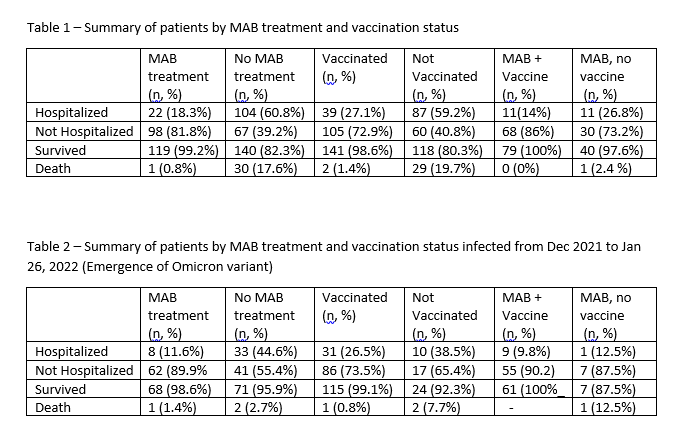
The impact of monoclonal antibody against SARS-CoV2 and vaccination on outcomes in kidney transplant recipients with COVID-19
Nicole Ali1, Vasishta Tatapudi1, Ranjetta Chand1, Kimberly Sureau1, Sapna Mehta1, Robert Montgomery1.
1Transplant Institute, NYU Langone Health, New York, NY, United States; 2CareDx, CareDx, Brisbane, CA, United States
Purpose: Solid organ transplant recipients are at high risk of morbidity and mortality from coronavirus disease 2019 (COVID-19) with mortality rates as high as 30% reported in the early pandemic period. COVID-19 vaccine efficacy in the immunosuppressed population is lower than the general population. Early studies suggest that monoclonal antibody (MAB) treatment against the SARS-CoV-S spike protein may decrease hospitalizations and emergency department (ED) visits. Herein, we report our single center experience with use of MAB for COVID-19 treatment in kidney transplant recipients.
Methods: We performed a retrospective chart review of all kidney transplant recipients who developed COVID-19 from March 17, 2020 to January 26, 2022 at our transplant center. Date of diagnosis, vaccine status, MAB treatment, hospitalization and patient outcome was reviewed.
Results: Two hundred ninety-one kidney transplant recipients had positive testing for SARS-CoV-2 in the period reviewed. 120 (41%) patients received MAB treatment. One patient death which was not COVID related was excluded from analysis. Of patients who received MAB treatment, 99.2% survived compared to 82.4% of those who did not (p=0.00), Figure 1. Hospitalization was lower in those who received MAB (18.3% vs 60.8%, p=0.00). Completion of vaccine series, defined as 2 doses of mRNA or 1 dose of Janssen vaccine prior to infection, was also associated with better survival (98.6% vs 80.3%, p=0.00), Figure 1. Hospitalization rate was lower in those who completed vaccination prior to infection with SARS-CoV-2 (27.1% vs 59.2%, p = 0.00). The combination of MAB therapy and completion of vaccination also decreased hospitalization compared to those who received MAB but did not complete vaccines series (14% vs 26.8%, Table 1). Subgroup analysis of 143 patients infected from December 2021 to Jan 26, 2022 which may have reflected the Omicron surge was performed (Table 2). Treatment with MAB was associated with a reduction in hospitalization (11.6%) compared to 44.6% in those who did not receive MAB.
Conclusion: MAB treatment for COVID-19 and prior vaccination were associated with improved survival and decreased risk of hospitalization in kidney transplant recipients.

